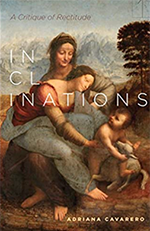
Inclinations: A Critique of Rectitude
“Inclinations bears all the marks of Cavarero's work more generally: rigorous argumentation, a style at once direct and playful, a wide-ranging command of the philosophical tradition, combined with trenchant feminist critique.”—Barbara Spackman; University of California at Berkeley
Stanford University Press 2016
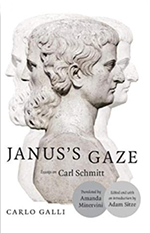
Janus’s Gaze: Essays on Carl Schmitt
First published in Italian in 2008 and appearing here in English for the first time, Janus's Gaze is the culmination of Carlo Galli's ongoing critique of the work of Carl Schmitt. Galli argues that Schmitt's main accomplishment, as well as the thread that unifies his oeuvre, is his construction of a genealogy of the modern that explains how modernity's compulsory drive to achieve order is both necessary and impossible. Galli addresses five key problems in Schmitt's thought: his relation to the state, the significance of his concept of political theology, his readings of Machiavelli and Spinoza, his relation to Leo Strauss, and his relevance for contemporary political theory. Galli emphasizes the importance of passing through Schmitt’s thought—and, more important, beyond Schmitt’s thought—if we are to achieve insight into the problems of the global age.
"Carlo Galli is the greatest interpreter of Carl Schmitt today. In his book, Galli reconstructs with incredible expertise the categories of 'decision,' 'sovereignty,' 'conflict,' and 'political theology' as they relate to major modern political thinkers. What ensues is a penetrating look, not solely into Schmitt's own conceptualizations, but into our contemporary moment."—Roberto Esposito, author of Categories of the Impolitical
"Carlo Galli is certainly the most important scholar of Carl Schmitt in Italy and, to my knowledge, in the world. Among Galli's virtues is how well he situates Schmitt's concepts both in the context of Schmitt's entire opus and in the context of twentieth-century German politics and political theory. Galli's essays provide brilliant explications and explorations of Schmitt's central concepts, and Adam Sitze's introduction and Amanda Minervini's translation are exemplary."—Michael Hardt, coauthor of Empire
Duke University Press, 2015
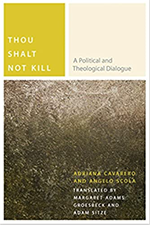
Thou Shalt Not Kill: A Political and Theological Dialogue
“Thou Shalt Not Kill represents an exceptionally original contribution to the study of contemporary Western culture seen from both a religious and a secular
feminist perspective.”―Alessia Ricciardi, Northwestern University
The remarkable dialogue Scola and Cavarero between demonstrates the ethical, theological, and the political stakes of the prohibition of killing. Interpreting the prohibition of murder in the context of Levinas’s ethics, Scola proposes what Cavarero calls an 'absolutist' interpretation of such prohibition and argues for its applicability both to suicide and to reproduction. By contrast, Cavarero brilliantly demonstrates the incoherence of such an interpretation, particularly in the context of new reproductive technologies, medical technologies, and modern warfare. Instead of ethical relationality, such an absolute application of the prohibition of killing, all too often coexisting with the justifications of just or preemptive war, leads to the valorization of impersonal biologism. This is an indispensable book for anyone interested in the contemporary debates about ethics, biopolitics, and bioethics.---―Ewa Plonowska Ziarek, author of Feminist Aesthetics and the Politics of Modernism
Fordham University Press 2015

The Impossible Machine: A Genealogy of South Africa's Truth and Reconciliation Commission
“Beautifully written and engaging to read . . . the book will be a significant contribution to the corpus of political, legal, and philosophical work on transitional justice and postcolonial justice more generally, will have a wide audience and is likely to reshape the field of transitional and postcolonial justice studies.” —Fiona Ross, University of Cape Town A fresh, though counterintuitive, analysis of South Africa’s Truth and Reconciliation Commission.
“[Sitze] makes an invaluable contribution to our understanding of the origins and historical location of the South African TRC and poses important questions to both scholars of transitional justice as well as scholars and practitioners of South African law and legal history.” —Heinz Klug, University of Wisconsin Law School
“[W]e would encourage political theorists, scholars of transitional justice and individuals engaged in these commissions in their own countries to read this book as it provides an original, ground breaking and extraordinarily powerful critique of the colonial dimensions of the South African [TRC] that provides important new insights into the potentially impossible nature of such machines.” —Barbara Arneil and Jason Tockman, Contemporary Political Theory
The University of Michigan Press, 2013
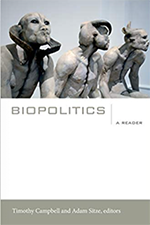
Biopolitics: A Reader
This anthology collects the texts that defined the concept of biopolitics that has become so significant throughout the humanities and social sciences today. The far-reaching influence of the biopolitical—the relation of politics to life, or the state to the body—is not surprising given its centrality to matters such as healthcare, abortion, immigration, and the global distribution of essential medicines and medical technologies. In his famous 1976 essay, "Right of Death and Power over Life," Michel Foucault gave a new and unprecedented meaning to the term "biopolitics." In this anthology, that touchstone piece is followed by essays in which biopolitics is implicitly anticipated as a problem by Hannah Arendt and later altered, critiqued, deconstructed, and refined by major political and social theorists who explicitly engaged with Foucault's ideas. By focusing on the concept of biopolitics, rather than applying it to specific events and phenomena, this reader provides an enduring framework for assessing the central problematics of modern political thought.
“This reader will be a landmark resource as scholarly engagement with biopolitics continues to expand in the coming years. It brings together in a single volume essential texts in the evolution of thinking about the biopolitical in the wake of the formative thought of Foucault and, later, Agamben. In addition, the selections are framed by a wonderfully nuanced and incisive introduction.”—Cary Wolfe, author of Before the Law: Humans and Other Animals in a Biopolitical Frame
“Campbell and Sitze’s Biopolitics: A Reader is…an essential resource for graduate students and those new to the topic of biopolitics as well as a useful tool for the few with specialist knowledge.” —Diana Stypinska, The Sociological Review
Duke University Press, 2013
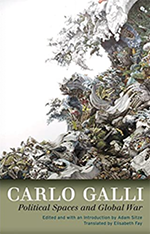
Political Spaces and Global War
A provocative genealogy of the global age.
“Carlo Galli’s Political Spaces and Global War offers an extremely valuable analysis of globalization: its opportunities, its risks, and its antinomies. Galli adopts a historical and conceptual approach to explore the complex relationship between globalization and the political categories of modernity, and arrives at a deeply troubling conclusion about the fate of Western civilization.” —Roberto Esposito
“Once in a while, a thinker comes along and poses the familiar questions of political theory in a startling new way. Carlo Galli does just that. He relentlessly tracks the political reproduction of space in politics and political theory to show how the modern quest for freedom, equality, democracy, sovereignty, universality and more all turn on a politics of space now effaced by the global war, which despatializes and deinstitutionalizes politics, losing the difference between sky, land, and sea and bringing traditional theaters together “in a war without strategy or frontier.” With this English translation, new readers will discover Galli’s unique voice, illuminated by Adam Sitze, whose useful introduction sets Galli’s work in the context of post 1968 Italian politics and theory.” —Bonnie Honig
“This book offers an intriguing analysis of political spaces that will hopefully be continued in future translations of Galli’s works.” — Cambridge Review of International Affairs
“A provocative, stimulating text for scholars dwelling on the relationship between the spatial and the political.” — Environment and Planning D: Society and Space
“This book puts forward an exciting contribution to the discussion on the relevance of modernity’s conceptual categories in the postmodern condition.” — Social Transformations
Best Books of 2010 on Social and Political Awareness —Anis Shivani, Huffington Post
The University of Minnesota Press, 2010